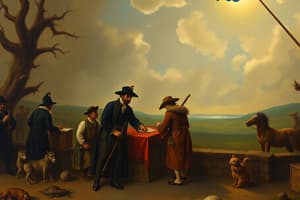Podcast
Questions and Answers
What is the main focus of the book 'Can't you Make them Behave, King George'?
What is the main focus of the book 'Can't you Make them Behave, King George'?
- The influence of British culture on American colonies
- The role of King George in the American Revolution
- The impact of taxation without representation (correct)
- The events leading up to the Boston Tea Party
Which historical concept is addressed in 'Can't you Make them Behave, King George'?
Which historical concept is addressed in 'Can't you Make them Behave, King George'?
- The abolitionist movement
- The American Revolution (correct)
- The Civil War
- The Great Depression
What perspective does the book provide regarding 'taxation without representation'?
What perspective does the book provide regarding 'taxation without representation'?
- A global perspective
- A neutral perspective
- A pro-American perspective (correct)
- A pro-British perspective
Which aspect of history does 'Can't you Make them Behave, King George' aim to illuminate?
Which aspect of history does 'Can't you Make them Behave, King George' aim to illuminate?
What is the primary goal of 'Can't you Make them Behave, King George'?
What is the primary goal of 'Can't you Make them Behave, King George'?
'Can't you Make them Behave, King George' aims to provide a viewpoint on colonial history that is:
'Can't you Make them Behave, King George' aims to provide a viewpoint on colonial history that is:
What distinguishes 'Can't you Make them Behave, King George' from standard textbooks?
What distinguishes 'Can't you Make them Behave, King George' from standard textbooks?
'Can't you Make them Behave, King George' seeks to challenge students' understanding of:
'Can't you Make them Behave, King George' seeks to challenge students' understanding of:
'Can't you Make them Behave, King George' serves as a tool to:
'Can't you Make them Behave, King George' serves as a tool to:
What kind of impact does 'Can't you Make them Behave, King George' aim to have on students?
What kind of impact does 'Can't you Make them Behave, King George' aim to have on students?
How does 'Can't you Make them Behave, King George' address the topic of representation?
How does 'Can't you Make them Behave, King George' address the topic of representation?
What distinguishes 'Can't you Make them Behave, King George' from other historical texts?
What distinguishes 'Can't you Make them Behave, King George' from other historical texts?
Flashcards are hidden until you start studying
Study Notes
"Can't you Make them Behave, King George" is a book that provides students with a view of "taxation without representation" that they do not receive from their textbooks [Beck & McKeown, 1991] [McGowan & Guzzetti, 1991] [Fritz, 1977] [Beck & McKeown, 1991] [Beck & McKeown, 1991] [Beck & McKeown, 1991] [Beck & McKeown, 1991] [Beck & McKeown, 1991] [Beck & McKeown, 1991] [Beck & McKeown, 1991] [Beck & McKeown, 1991] [Beck & McKeown, 1991] [Beck & McKeown, 1991] [Beck & McKeown, 1991] [Beck & McKeown, 1991] [Beck & McKeown, 1991] [Beck & McKeown, 1991] [Beck & McKeown, 1991] [Beck & McKeown, 1991] [Beck & McKeown, 1991] [Beck & McKeown, 1991] [Beck & McKeown, 1991] [Beck & McKeown, 1991] [Beck & McKeown, 1991] [Beck & McKeown, 1991] [Beck & McKeown, 1991] [Beck & McKeown, 1991] [Beck & McKeown, 1991] [Beck & McKeown, 1991] [Beck & McKeown, 1991] [Beck & McKeown, 1991] [Beck & McKeown, 1991] [Beck & McKeown, 1991] [Beck & McKeown, 1991] [Beck & McKeown, 1991] [Beck & McKeown, 1991] [Beck & McKeown, 1991] [Beck & McKeown, 1991] [Beck & McKeown, 1991] [Beck & McKeown, 1991] [Beck & McKeown, 1991] [Beck & McKeown, 1991] [Beck & McKeown, 1991] [Beck & McKeown, 1991] [Beck & McKeown, 1991] [Beck & McKeown, 1991] [Beck & McKeown, 1991] [Beck & McKeown, 1991] [Beck & McKeown, 1991] [Beck & McKeown, 1991] [Beck & McKeown, 1991] [Beck & McKeown, 1991] [Beck & McKeown, 1991] [Beck & McKeown, 1991] [Beck & McKeown, 1991] [Beck & McKeown, 1991] [Beck & McKeown, 1991] [Beck & McKeown, 1991] [Beck & McKeown, 1991] [Beck & McKeown, 1991] [Beck & McKeown, 1991] [Beck & McKeown, 1991] [Beck & McKeown, 1991] [Beck & McKeown, 1991] [Beck & McKeown, 1991] [Beck & McKeown, 1991] [Beck & McKeown, 1991] [Beck & McKeown, 1991] [Beck & McKeown, 1991] [Beck & McKeown, 1991] [Beck & McKeown, 1991] [Beck & McKeown, 1991] [Beck & McKeown, 1991] [Beck & McKeown, 1991] [Beck & McKeown, 1991] [Beck & McKeown, 1991] [Beck & McKeown, 1991] [Beck & McKeown, 1991] [Beck & McKeown, 1991] [Beck & McKeown, 1991] [Beck & McKeown, 1991] [Beck & McKeown, 1991] [Beck & McKeown, 1991] [Beck & McKeown, 1991] [Beck & McKeown, 1991] [Beck & McKeown, 1991] [Beck & McKeown, 1991] [Beck & McKeown, 1991] [Beck & McKeown, 1991] [Beck & McKeown, 1991] [Beck & McKeown, 1991] [Beck & McKeown, 1991] [Beck & McKeown, 1991] [Beck & McKeown, 1991] [Beck & McKeown, 1991] [Beck & McKeown, 1991] [Beck & McKeown, 1991] [Beck & McKeown, 1991] [Beck & McKeown, 1991] [Beck & McKeown, 1991] [Beck & McKeown, 1991] [Beck & McKeown, 1991] [Beck & McKeown, 1991] [Beck & McKeown, 1991] [Beck & McKeown, 1991] [Beck & McKeown, 1991] [Beck & McKeown, 1991] [Beck & McKeown, 1991] [Beck & McKeown, 1991] [Beck & McKeown, 1991] [Beck & McKeown, 1991] [Beck & McKeown, 1991] [Beck & McKeown, 1991] [Beck & McKeown, 1991] [Beck & McKeown, 1991] [Beck & McKeown, 1991] [Beck & McKeown, 1991] [Beck & McKeown, 1991] [Beck & McKeown, 1991] [Beck & McKeown, 1991] [Beck & McKeown, 1991] [Beck & McKeown, 1991] [Beck & McKeown, 1991] [Beck & McKeown, 1991] [Beck & McKeown, 1991] [Beck & McKeown, 1991] [Beck & McKeown, 1991] [Beck & McKeown, 1991] [Beck & McKeown, 1991] [Beck & McKeown, 1991] [Beck & McKeown, 1991] [Beck & McKeown, 1991] [Beck & McKeown, 1991] [Beck & McKeown, 1991] [Beck & McKeown, 1991] [Beck & McKeown, 1991] [Beck & McKeown, 1991] [Beck & McKeown, 1991] [Beck & McKeown, 1991] [Beck & McKeown, 1991] [
Studying That Suits You
Use AI to generate personalized quizzes and flashcards to suit your learning preferences.




